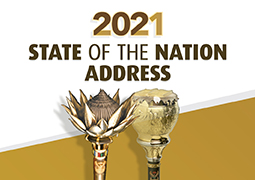
Speaking on state-owned enterprises (SOEs), which were paralysed by, among other things, mismanagement and looting, President Cyril Ramaphosa said they are increasingly becoming a liability to taxpayers than ever before. He said, as if that is not enough, the government is now faced with a new challenge of arresting the disruptive effects of Covid-19 outbreak to the economy and its growing financial burden.
He said the Presidential State-Owned Enterprises Council has outlined a clear set of reforms that will enable the SOEs to fulfil their mandate for growth and development.
He said overarching legislation for SOEs will be tabled in Cabinet this financial year and in Parliament in the next financial year. He added that a centralised SOEs model is being implemented this financial year, which will ensure a standardised governance, financial management and operational performance framework for all SOEs.
In response to the increasing graft at SOEs, he said the new legislation is aimed at restoring the socio-economic mandate of the SOEs which was, over the years, eroded by incompetency and gross mismanagement. In addition to that, he said: “A centralised SOEs model is being implemented this financial year, which will ensure a standardised governance, financial management and operational performance framework for all SOEs to ensure that they are responsive to the country’s needs and the implementation of the National Development Plan.”
Turning to Eskom, President Ramaphosa assured the nation that hard work is being done to turn the fortunes of the utility around to ensure that its intermittent load shedding does not impact negatively on the economy as is the case now. Part of its turnaround strategy hinges on its restructuring process which seeks to ensure that generation, distribution and transmission operate as independent legal entities. This will be coupled with the addition of renewable energy sources and independent energy producers to the national grid.
He said these are pronouncements that form part of the broader structural economic reforms aimed at propelling high economic growth rates and employment. A commitment that is championed by Operation Vulindlela, which draws critical skills and resources from both the National Treasury and the President’s office. The President conceded that “these reforms are necessary to reduce costs and barriers to entry, increase competition, stimulate new investment and create space for new entrants in the market”.
By Abel Mputing
12 February 2021

